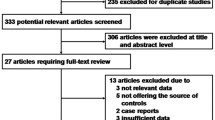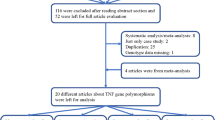Abstract
To date, several studies have been conducted to assess the association between endothelial nitric oxide synthase (eNOS) gene 894G > T polymorphism and prostate cancer (PCa) risk, but the results are conflicting. To derive a more precise estimation of the relationship between 894G > T polymorphism and PCa risk, the present meta-analysis was performed. A total of eight case–control studies were included in this meta-analysis. The pooled odds ratio (OR) with 95 % confidence interval (CI) was calculated to evaluate the associations. Our results suggested that 894G > T polymorphism is associated with PCa risk under codominant (GT vs. GG) (OR = 1.11, 95 % CI = 1.01–1.22, P = 0.04) and overdominant (GT vs. GG + TT) (OR = 1.12, 95 % CI = 1.02–1.23, P = 0.02) models in the overall population, while there are no associations observed under dominant (GT + TT vs. GG), recessive (TT vs. GG + GT), and allelic (T vs. G) models. Moreover, when the eligible studies were stratified according to sources of control, significant association between 894G > T polymorphism and susceptibility of PCa was also identified under codominant (OR = 1.12, 95 % CI = 1.01–1.24, P = 0.03) and overdominant (OR = 1.13, 95 % CI = 1.02–1.25, P = 0.02) models when using healthy individuals as control. However, there are no significant associations found under any genetic models when using BPH patients as control group. In conclusion, the present meta-analysis suggested that the eNOS gene 894G > T polymorphism might be a risk factor in the onset of PCa.


Similar content being viewed by others
References
Gronberg H. Prostate cancer epidemiology. Lancet. 2003;361:859–64.
Damber J-E, Aus G. Prostate cancer. Lancet. 2008;371:1710–21.
Berger MF, Lawrence MS, Demichelis F, Drier Y, Cibulskis K, et al. The genomic complexity of primary human prostate cancer. Nature. 2011;470:214–20.
Hao Y, Montiel R, Huang Y. Endothelial nitric oxide synthase (eNOS) 894G > T polymorphism is associated with breast cancer risk: a meta-analysis. Breast Cancer Res Treat. 2010;124:809–13.
Hu X, Fang Y, Zheng J, He Y, Zan X, et al. The association between HIF-1alpha polymorphism and cancer risk: a systematic review and meta-analysis. Tumour Biol. 2013. doi:https://doi.org/10.1007/s13277-013-1160-x.
Chen J, Yuan T, Liu M, Chen P. Association between TCF7L2 gene polymorphism and cancer risk: a meta-analysis. PLoS One. 2013;8:e71730.
Amankwah EK, Sellers TA, Park JY. Gene variants in the angiogenesis pathway and prostate cancer. Carcinogenesis. 2012;33:1259–69.
Bhowmick R, Girotti AW. Pro-survival and pro growth effects of stress-induced nitric oxide in a prostate cancer photodynamic therapy model. Cancer Lett. 2013. doi:10.1016/j10.1016/j.
Dillioglugil MO, Mekik H, Muezzinoglu B, Ozkan TA, Demir CG, et al. Blood and tissue nitric oxide and malondialdehyde are prognostic indicators of localized prostate cancer. Int Urol Nephrol. 2012;44:1691–6.
Singh S, Gupta AK. Nitric oxide: role in tumour biology and iNOS/NO-based anticancer therapies. Cancer Chemother Pharmacol. 2011;67:1211–24.
Burke AJ, Sullivan FJ, Giles FJ, Glynn SA. The yin and yang of nitric oxide in cancer progression. Carcinogenesis. 2013;34:503–12.
Le X, Wei D, Huang S, Lancaster Jr JR, Xie K. Nitric oxide synthase II suppresses the growth and metastasis of human cancer regardless of its up-regulation of protumor factors. Proc Natl Acad Sci U S A. 2005;102:8758–63.
Coulter JA, Page NL, Worthington J, Robson T, Hirst DG, et al. Transcriptional regulation of inducible nitric oxide synthase gene therapy: targeting early stage and advanced prostate cancer. J Gene Med. 2010;12:755–65.
Xie K, Huang S, Dong Z, Juang SH, Gutman M, et al. Transfection with the iNOS gene suppresses tumorigenicity and abrogates metastasis by K-1735 murine melanoma cells. J Exp Med. 1995;181:1333–43.
Heller A. Apoptosis-inducing high (.)NO concentrations are not sustained either in nascent or in developed cancers. ChemMedChem. 2008;3:1493–9.
Mocellin S, Bronte V, Nitti D. Nitric oxide, a double edged sword in cancer biology: searching for therapeutic opportunities. Med Res Rev. 2007;27:317–52.
Tong X, Li H. eNOS protects prostate cancer cells from TRAIL-induced apoptosis. Cancer Lett. 2004;210:63–71.
Lim KH, Ancrile BB, Kashatus DF, Counter CM. Tumour maintenance is mediated by eNOS. Nature. 2008;452:646–9.
Tesauro M, Thompson WC, Rogliani P, Qi L, Chaudhary PP, et al. Intracellular processing of endothelial nitric oxide synthase isoforms associated with differences in severity of cardiopulmonary diseases: cleavage of proteins with aspartate vs. glutamate at position 298. Proc Natl Acad Sci U S A. 2000;97:2832–5.
Veldmana BA, Spieringb W, Doevendansc PA, Vervoorta G, Kroonb AA, et al. The Glu298Asp polymorphism of the NOS 3 gene as a determinant of the baseline production of nitric oxide. J Hypertens. 2002;20:2023–7.
Medeiros R, Morais A, Vasconcelos A, Costa S, Pinto D, et al. Endothelial nitric oxide synthase gene polymorphisms and genetic susceptibility to prostate cancer. Eur J Cancer Prev. 2002;11:343–50.
Brankovic A, Brajuskovic G, Nikolic Z, Vukotic V, Cerovic S, et al. Endothelial nitric oxide synthase gene polymorphisms and prostate cancer risk in Serbian population. Int J Exp Pathol. 2013;94:355–61.
Marangoni K, Neves AF, Cardoso AM, Santos WK, Faria PC, et al. The endothelial nitric oxide synthase Glu-298-Asp polymorphism and its mRNA expression in the peripheral blood of patients with prostate cancer and benign prostatic hyperplasia. Cancer Detect Prev. 2006;30:7–13.
Lee KM, Kang D, Park SK, Berndt SI, Reding D, et al. Nitric oxide synthase gene polymorphisms and prostate cancer risk. Carcinogenesis. 2009;30:621–5.
Jacobs EJ, Hsing AW, Bain EB, Stevens VL, Wang Y, et al. Polymorphisms in angiogenesis-related genes and prostate cancer. Cancer Epidemiol Biomark Prev. 2008;17:972–7.
Chen ZG, Zhou W, Tao ZH, Chen W. Association of endothelial nitric oxide synthase gene polymorphism with prostate cancer. Zhong Guo Nan Ke Xue Za Zhi. 2011;25(7):18–21.
Ziaei SAM, Samzadeh M, Jamaldini SH, Afshari M, Haghdoost AA, et al. Endothelial nitric oxide synthase Glu298Asp polymorphism as a risk factor for prostate cancer. Int J Biol Markers. 2012;00:1–6.
Safarinejad MR, Safarinejad S, Shafiei N, Safarinejad S. Effects of the T-786C, G894T, and Intron 4 VNTR (4a/b) polymorphisms of the endothelial nitric oxide synthase gene on the risk of prostate cancer. Urol Oncol. 2013;31:1132–40.
DerSimonian R, Laird N. Meta analysis in clinical trials. Control Clin Trials. 1996;7:177–88.
DerSimonian R. Combining evidence from clinical trials. Anesth Analg. 1990;70:475–6.
Peters JL, Sutton AJ, Jones DR, Abrams KR, Rushton L. Comparison of two methods to detect publication bias in meta-analysis. JAMA. 2006;295:676–80.
Choudhari SK, Chaudhary M, Bagde S, Gadbail AR, Joshi V. Nitric oxide and cancer: a review. World J Surg Oncol. 2013;11:118.
Ruisanchez E, Dancs P, Kerek M, Nemeth T, Farago B, et al. Lysophosphatidic acid induces vasodilation mediated by LPA1 receptors, phospholipase C, and endothelial nitric oxide synthase. FASEB J. 2013;28:880–90.
Deqiu Z, Kang L, Jiali Y, Baolin L, Gaolin L. Luteolin inhibits inflammatory response and improves insulin sensitivity in the endothelium. Biochimie. 2011;93:506–12.
Feletou M, Lonchampt M, Coge F, Galizzi J-P, Bassoullet C, et al. Regulation of murine airway responsiveness by eNOS. Am J Physiol Lung Cell Mol Physiol. 2001;281:258–67.
Song Y, Zhao XP, Song K, Shang ZJ. Ephrin-A1 Is Up-regulated by hypoxia in cancer cells and promotes angiogenesis of HUVECs through a coordinated cross-talk with eNOS. PLoS One. 2013;8:e74464.
Funke S, Risch A, Nieters A, Hoffmeister M, Stegmaier C, et al. Genetic polymorphisms in genes related to oxidative stress (GSTP1, GSTM1, GSTT1, CAT, MnSOD, MPO, eNOS) and survival of rectal cancer patients after radiotherapy. J Cancer Epidemiol. 2009;2009:302047.
Jang MJ, Jeon YJ, Kim JW, Chong SY, Hong SP, et al. Association of eNOS polymorphisms (-786 T > C, 4a4b, 894G > T) with colorectal cancer susceptibility in the Korean population. Gene. 2013;512:275–81.
Wu JH, Yang K, Ma HS, Xu Y. Association of endothelia nitric oxide synthase gene rs1799983 polymorphism with susceptibility to prostate cancer: a meta-analysis. Tumour Biol. 2014.
Zhang YG, Jia QY, He Q, Shen JN, Yang JQ, et al. The Glu298Asp polymorphism in the NOS3 gene and the risk of prostate cancer. Tumour Biol. 2014;35(5):4735–9. doi:10.1007/s13277-014-1619-4.
Conflicts of interest
None
Author information
Authors and Affiliations
Corresponding author
Rights and permissions
About this article
Cite this article
Zhao, C., Yan, W., Zu, X. et al. Association between endothelial nitric oxide synthase 894G>T polymorphism and prostate cancer risk: a meta-analysis of literature studies. Tumor Biol. 35, 11727–11733 (2014). https://doi.org/10.1007/s13277-014-2097-4
Received:
Accepted:
Published:
Issue Date:
DOI: https://doi.org/10.1007/s13277-014-2097-4




